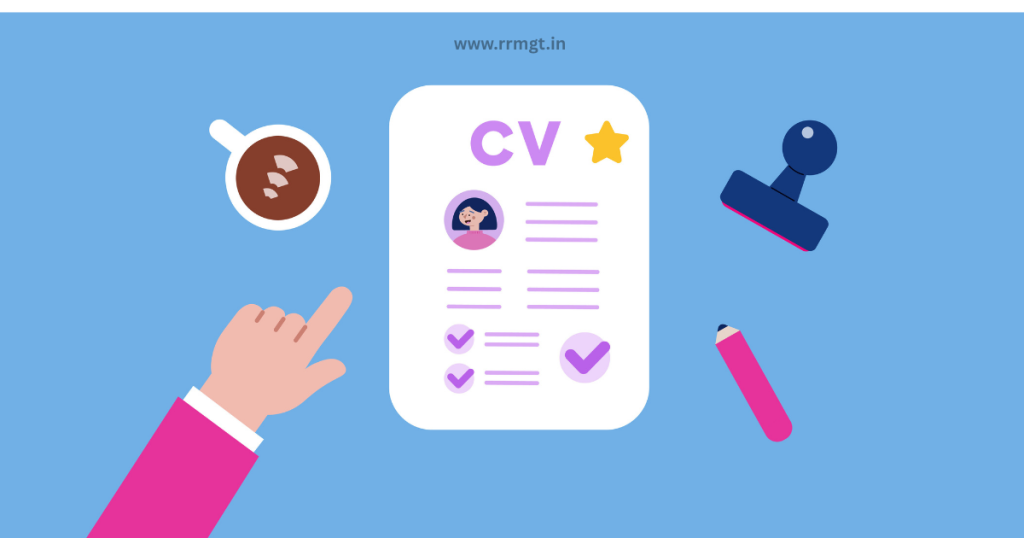The right document can open doors—the wrong one can close them forever.
Knowing which document to use can be the difference between your application being shortlisted or discarded.
In the diverse and competitive Indian job market, few questions cause as much confusion for fresh graduates and experienced professionals alike: “Should I send a CV, a Resume, or a Biodata?” This confusion often stems from the fact that these terms are sometimes used interchangeably in India, despite referring to very different documents.
Understanding the key difference between CV Resume and Biodata is not just a matter of semantics; it’s a crucial career skill. Using the wrong one can signal a lack of awareness to recruiters. This guide will demystify these documents, helping you choose the right tool for your next career move in India or abroad.
Table of Contents
1 What is a CV (Curriculum Vitae)?
The term CV stands for “Curriculum Vitae,” a Latin phrase meaning “course of your life.” This translation perfectly captures the essence of a CV—it is a comprehensive document that presents a detailed overview of your entire academic and professional history.

Purpose of CV
CVs are primarily used in specific professional contexts:
- Academic positions: Applications for faculty positions, research roles, and academic appointments typically require a CV.
- Research applications: When applying for research grants, fellowships, or research-intensive positions.
- Medical and scientific fields: Professionals in medicine, science, and research use CVs to document their extensive credentials.
- Overseas applications: Many European, Asian, and Middle Eastern countries prefer CVs over resumes for all job applications.
Length & Details Included
Unlike other application documents, a CV does not have a strict page limit. It expands as your career progresses, with senior academics and researchers often having CVs extending to 10 pages or more.
A comprehensive CV typically includes:
- Personal information and contact details
- Educational history (all degrees and institutions)
- Work experience/employment history
- Research experience
- Teaching experience (if applicable)
- Publications (books, articles, papers)
- Presentations at conferences and seminars
- Grants and fellowships awarded
- Professional licenses and certifications
- Awards, honors, and professional memberships
- Relevant skills and competencies
- References
When to Use a CV
You should use a CV when:
- Applying for academic positions
- Seeking research grants or fellowships
- Applying for positions in medicine, law, or research
- Applying to jobs in most European, Asian, or Middle Eastern countries
- The employer specifically requests a CV
2 What is a Resume?
The word “resume” derives from French and means “summary“—an appropriate name for this concise career document. A resume provides a brief overview of your skills, qualifications, and experiences relevant to a specific position.

Purpose of Resume
Resumes are designed for efficiency and relevance in fast-paced hiring environments.
The sole purpose of a resume is to get you an interview. It is designed for:
- Private Sector Jobs: IT companies (like TCS, Infosys), startups, banking (like ICICI, HDFC), and multinational corporations (MNCs) in India.
- Quick Screening: It allows a recruiter, who may only spend 30 seconds on it, to see your value immediately.
Key Features of Resume
Several distinguishing characteristics set resumes apart from other application documents:
- Short: Ideally 1 page, maximum 2 pages.
- Skills-Focused: Highlights relevant skills (e.g., Java, Digital Marketing, Salesforce).
- Customizable: You should tailor it for every single job application.
Format of a Resume
A standard resume format in India includes:
- Contact Information (with LinkedIn profile)
- Career Objective or Professional Summary
- Work Experience (with bullet-pointed achievements)
- Education (Degrees, Universities, Percentages/CGPA)
- Key Skills (Technical & Soft Skills)
- Certifications (e.g., from NASSCOM, Coursera, Udemy)
When to Use a Resume
A resume is the appropriate choice when:
- Applying for positions in the private sector (corporate jobs)
- Job hunting in the U.S., Canada, or Australia
- The employer specifically requests a resume
- Applying for non-academic, non-research positions
- You want to emphasize recent, relevant experience over comprehensive history
3 What is a Biodata?
Biodata, short for “biographical data,” is a document that focuses on personal information rather than professional qualifications. While the term is sometimes used interchangeably with resume or CV in some regions, biodata has distinct characteristics and uses.
Meaning of Biodata
Biodata emphasizes personal details and demographic information about an individual. It typically includes factual data that helps in profiling a person for various purposes beyond employment.
Purpose of Biodata
Biodata serves multiple functions across different contexts:
- Matrimonial Proposals: This is its most famous use. Biodata acts as a formal profile for arranged marriages.
- Government Jobs: Some government sectors and public sector undertakings (PSUs) still require a biodata format for applications.
Format of Biodata
Biodata typically includes more personal information than would normally appear on a resume or CV:
- Personal particulars: Name, date of birth, gender, marital status, nationality
- Physical attributes: Height, weight, complexion (especially in marriage biodata)
- Family background: Parents’ names, occupations, siblings’ details
- Contact information: Address, phone number, email
- Education and work details: Often presented in a simple chronological format
- Other information: Religion, caste, hobbies, interests
Biodata used for marriage purposes often includes additional details such as family background, horoscope information, lifestyle habits, and partner expectations.
When to Use a Biodata
Biodata is appropriate in these specific situations:
- Applying for government jobs in certain countries (India, Bangladesh)
- Responding to requests for arranged marriage proposals
- Applications requiring extensive personal profiling
- Specific employer or organizational requests for biodata
4 Key Difference Between CV Resume and Biodata
| Feature | CV | Resume | Biodata |
| Meaning | Course of life | Summary | Biographical data |
| Length | No limit, typically 2-8+ pages | 1-2 pages maximum | 1-3 pages |
| Focus | Academic & research achievements | Skills & relevant professional experience | Personal details & demographic information |
| Content | Comprehensive career history, publications, research | Targeted professional experience & skills | Personal facts, family background, physical attributes |
| Usage | Academia, research, medicine, international applications | Corporate jobs, private sector (US, Canada, Australia) | Government jobs (some countries), marriage proposals |
| Geography | Preferred in UK, EU, Asia, Middle East | Standard in US and Canada | Primarily used in South Asian countries |
| Customization | Generally static, updated as new accomplishments occur | Highly customized for each position | Often standardized, with minor modifications |
5 Which One Should You Use?
Choosing the right document depends on your target role, industry, and geographical location:
- Applying to an IT company, startup, or private bank? → Use a Resume.
- Applying for a Professor role or a Research Scientist position? → Use a CV.
- Filling out a form for an SSC, UPSC, or State Govt. job? → They will provide their own form, but if asked to attach a document, it might be a Biodata.
- Creating a profile for an arranged marriage? → Use a Biodata.
Simple Rule of Thumb: For 90% of corporate jobs in India, a well-crafted Resume is what you need.
When in doubt, ask the employer which document they prefer. If that’s not possible, research what’s standard in your industry and region. Many employers now provide specific application guidelines on their career portals.
6 Common Mistakes Job Seekers Make
Even experienced professionals often make these critical errors when preparing application documents:
- Using a 5-page CV for a Software Engineer role: Recruiters in the private sector don’t have the time. They want a resume.
- Including personal details on a resume: Adding photo, marital status, or father’s name on a resume for a private company is unnecessary and can lead to unconscious bias.
- Using the terms interchangeably: Calling a 1-page resume a “CV” is common, but knowing the difference shows professionalism.
- Using a single document for all applications: You must tailor your resume for each role to include relevant keywords.
Read This Blog 👉 How to Improve My Communication Skills for Interview in 2025
7 Tips to Make Your Document Stand Out
Regardless of which document you use, these strategies will enhance your application:
- Tailor for the job: Carefully review the job description and incorporate relevant keywords. Customize your document for each application to highlight the most relevant qualifications.
- Highlight skills and achievements: Use action verbs and quantify accomplishments whenever possible. For example: “Increased sales by 25% in six months” is more impactful than “Responsible for sales”.
- Keep it concise and relevant: Eliminate unnecessary information that doesn’t support your candidacy. Be selective about what to include, focusing on what matters most to the potential employer.
- Use a clean, professional format: Ensure your document is visually appealing with consistent formatting, clear section headings, and adequate white space. Choose professional fonts like Arial, Calibri, or Times New Roman between 10-12 point size.
- Proofread meticulously: Review your document multiple times for errors, and ask someone else to check it as well. Spelling and grammar mistakes can undermine an otherwise strong application.
- Update regularly: Add new experiences, skills, and accomplishments as they occur, so your document is always ready when opportunities arise.
Understanding the differences between a CV resume and biodata is more than an academic exercise—it’s a practical necessity in today’s competitive job market. Remember that your application document is your professional representative—it should present your qualifications in the most favorable light while respecting industry norms and employer expectations.




